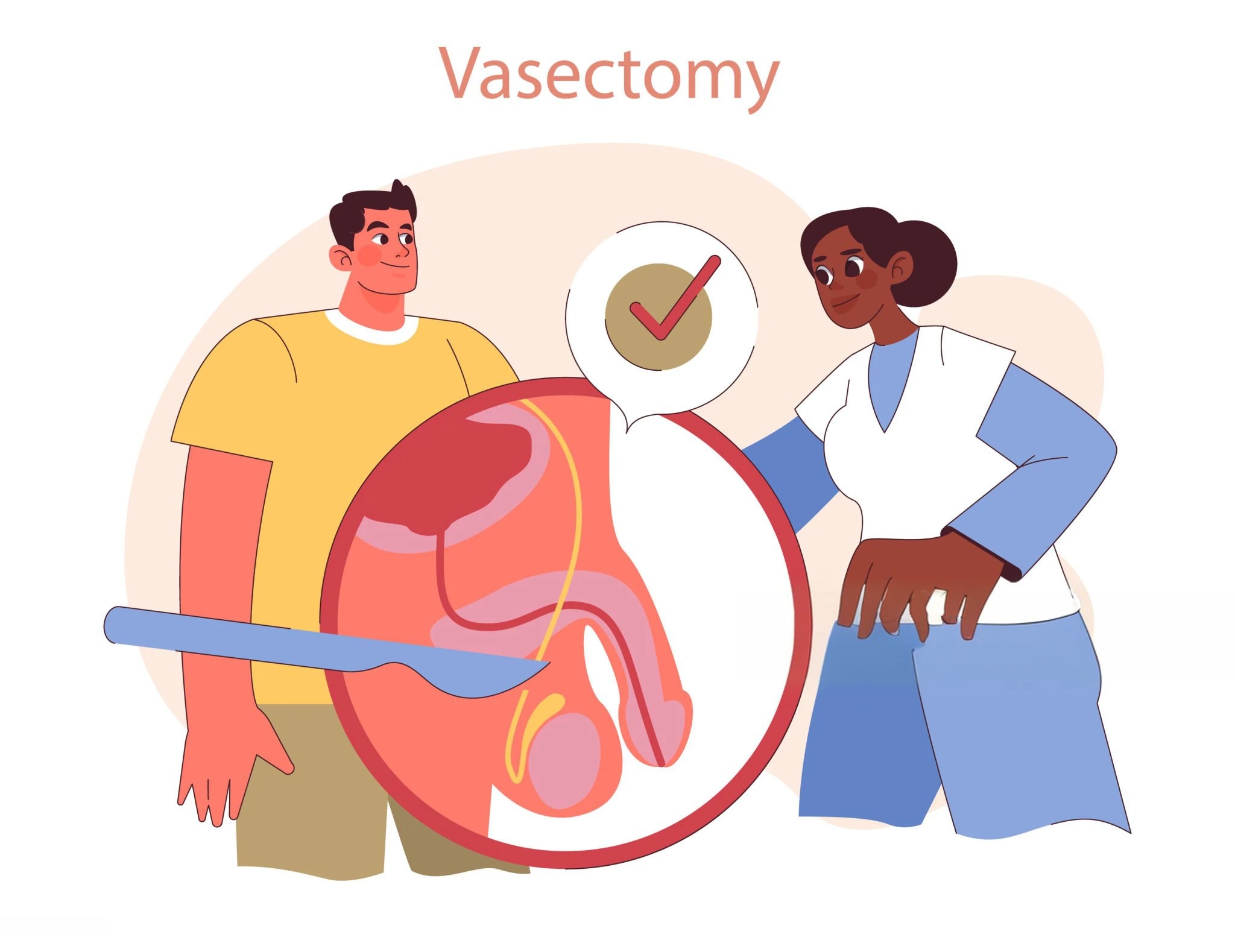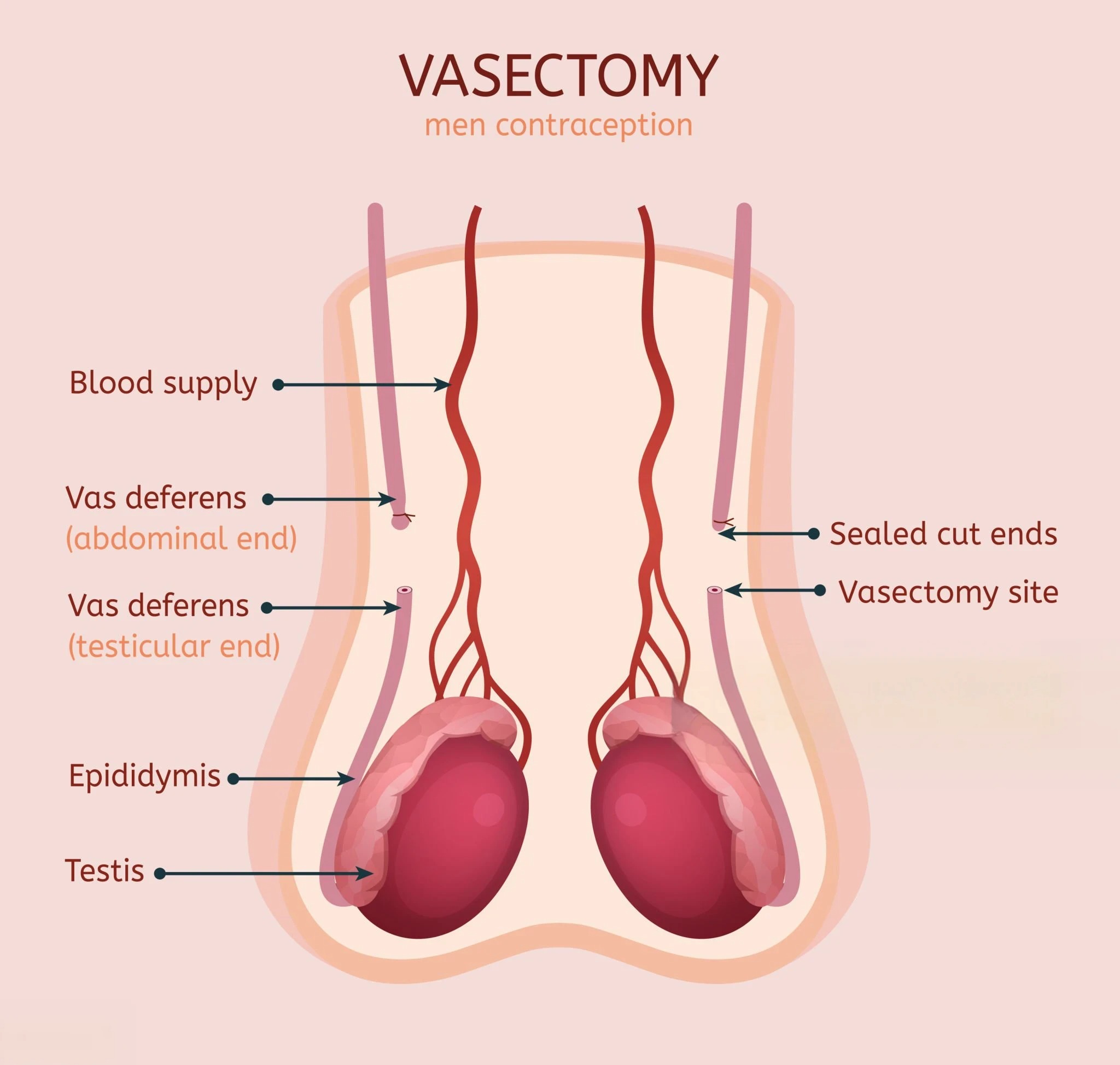Overview
Is your family complete and are you sure of that?
A vasectomy is a surgical procedure for male sterilization, entailing the severing of the duct that transports sperm from the testicles to the penis during ejaculation. The result can be compared to cutting a garden hose, halting the passage entirely.
While different approaches may be used to perform the procedure, the ultimate goal remains consistent to ensure the absence of sperm in ejaculation (azoospermia).
This form of contraception is considered permanent, so it is strongly recommended only for individuals or couples who are entirely certain they do not desire children or any additional children in the future.
No Scalpel Vasectomy
This vasectomy technique involves a small incision in the scrotum, requiring no stitches and resulting in a quick recovery. A semen test is conducted 16 weeks post-procedure to confirm the absence of sperm (azoospermia). Once confirmed, the method is over 95% reliable.
Learn More

Procedures
- Preparation: Pre-procedure guidance is provided to ensure the patient is ready, including any necessary instructions.
- During the Surgery: A no-scalpel method is used under local anesthesia, ensuring minimal discomfort and a faster recovery.
- Post-Surgery Care: Aftercare instructions are given, along with follow-up recommendations to confirm the procedure’s success.

We have no waiting time and can fit in suitable patients very quickly. We provide preoperative assessment by face to face, video, or telephone consultation. Please click on our Frequently Asked Questions for more information.
What is non-scalpel vasectomy (NSV)?
The vasectomy operation involves cutting the tubes that carry sperm. NSV is done through a puncture hole made in the scrotum, without the need for stitches afterward. After cutting the tubes the ends are sealed with heat (cautery). You then get a simple dressing and bandage, which can come off the next day. Compared to the traditional incisional technique, NSV results in less bleeding; less infections; less pain; a shorter operative time and quicker return to work.
Who should have a vasectomy?
A vasectomy is desirable only when you are sure that your family is complete be it someone with many children or someone certain he does not want any children at all. You should consider vasectomy a permanent form of contraception, as this cannot be reversed on the NHS. You should discuss your decision with your partner so that you both understand how a vasectomy will affect your lives. To access our service, you need to be referred by your GP. For NHS referrals Cleggs Lane Vasectomy Service currently accepts only patients registered with a Salford GP. (We also accept private referrals from everywhere, both local and international.)
A vasectomy is desirable only when you are sure that your family is complete be it someone with many children or someone certain he does not want any children at all. You should consider vasectomy a permanent form of contraception, as this cannot be reversed on the NHS. You should discuss your decision with your partner so that you both understand how a vasectomy will affect your lives. To access our service, you need to be referred by your GP. For NHS referrals Cleggs Lane Vasectomy Service currently accepts only patients registered with a Salford GP. (We also accept private referrals from everywhere, both local and international.)
How will you numb the pain?
A local anaesthetic injection is given. The needle is very tiny and can barely be felt, but when the medicine is injected, it might feel like a small sting. Numbness is achieved almost immediately. Some patients will not be suitable for injection, either due to an allergy to local anaesthetic, complicated history, or extreme needle phobia. General anaesthesia at the hospital would be suitable for such people, in which case they would be unsuitable for this service.
How effective is vasectomy?
Non-scalpel vasectomy is more than 99% effective, making it one of the most effective options available for both men and women, once sterility has been confirmed. Until this point, the patient must continue using birth control until it has been formally cleared by our clinic that there is no sperm left in his semen. This normally takes approximately 16 weeks with up to 30 ejaculations.
A vasectomy means you won’t need to take birth control steps before sex.
How long does the operation take?
The operation takes about 10 to 30 minutes.
How long does the operation take?What if I am taking anticoagulants or have other medical history?
If you are taking warfarin, heparin or DOAC (e.g., apixaban) these will cause increased risk of bleeding (haematoma), so you will need to stop taking these 3 days before the operation and resume as soon as operation is finished. If you are a high risk for a blood clot, please discuss with your GP before you stop your medications.
If you are taking aspirin, clopidogrel or non-steroidal anti-inflammatory drugs (e.g., ibuprofen) then you must stop these drugs 3 days before the procedure.
During preop we will check that your medical history is suitable for NSV.
What are the complications of Non-Scalpel Vasectomy?
Although it is an extremely reliable and safe option, there are always risks involved with any medical procedure, such as:
- Bleeding or a blood clot (hematoma) inside the scrotum.
- Blood in your semen- this is expected to settle.
- Bruising/swelling of your scrotum
- Infection of the surgery site-see your GP for antibiotics or contact us.
- Mild pain or discomfort- this can be treated with paracetamol +/- ibuprofen.
- Long term complications include post vasectomy pain syndrome, which is pain that goes on for 6 to12 months. This can affect up to 1-2% of men. The reason for this is unclear, although there are several theories, you may require a referral to a urologist.
- You may also ‘regret’ having the procedure, especially if your family dynamics change or you feel emotional stressed, so please think carefully, and make sure that this operation is what you want.
Will I have any problem with ejaculation?
A vasectomy should not stop you ejaculating. Sperm makes up less than 5% of an ejaculation, in fact all we do is disconnect this contribution, so there will be no noticeable difference in semen volume. After a vasectomy there should not be any sperm when you ejaculate and therefore no fear of pregnancy.
A vasectomy should not stop you ejaculating. Sperm makes up less than 5% of an ejaculation, in fact all we do is disconnect this contribution, so there will be no noticeable difference in semen volume. After a vasectomy there should not be any sperm when you ejaculate and therefore no fear of pregnancy.
When can I resume sex or physical activities?
There is not strict rule about when to resume sexual intercourse, but it is advised to delay this until pain or swelling settles. You are also advised to wait one week before activities such as running, lifting, cycling and football. We emphasise that you still need to continue contraception until we have tested you and confirmed that you are sterile.
Will I have any sexual difficulties?
There is no decrease in sexual desire (libido); no difficulty maintaining an erection nor problems with orgasm according to research. Some men/couples who have had a vasectomy have noted an increased sexual satisfaction due to less fear of unintended pregnancy.
Can vasectomy be reversed?
Technically, vasectomy can be reversed by re-joining the tubes via microsurgery, but this procedure is not available on the NHS. Vasectomy reversal is an expensive and lengthy procedure with no guarantee of success. We strongly advise that you to assume that your vasectomy will be permanent.
Can vasectomy increase risk of prostate cancer?
Although there have been some concerns about a possible link between vasectomy and testicular or prostate cancer in the past, there is no proven link.
Does vasectomy protect against sexually transmitted disease or infection?
After a vasectomy you can still transmit or acquire an STI or an STD when having unprotected sex. You still need a condom to prevent STIs if you are not in a stable relationship.
What are the alternatives to vasectomy?
For men alternative contraception are abstinence; withdrawal method and male condoms, which all have low reliability. Vasectomy is the only male sterilisation method to date.
Women can have long-acting reversible contraception (LARC) such as a subdermal implant, IUCD in the short term or tubal ligation for sterilisation. Please discuss these options with your GP.
What do I need to do on the day of the operation?
- Shower or bathe on the day of surgery. Wash your genital area thoroughly with soap and water. Trim or shave scrotal hair.
- Bring a pair of tight-fitting underwear to support the scrotum after the operation.
- Arrange for a lift home after your surgery to avoid pressure and pain on the surgery area caused by driving.
- If your GP has felt a need to prescribe you a sedative to lessen your anxiety, then take this about an hour before the operation and do not drive at all if you have taken a sedative.
What do I need to do after my Non-Scalpel Vasectomy?
- Continue contraception. We advise you to ejaculate about 30 times over the next 16 weeks, by whichever method possible.
- You will be sent a pack in the post to provide your semen sample 16 weeks after your vasectomy, using the address you give us. Confidentiality for this will be your responsibility.
- You will need to return the pack in post using the tracked envelope provided. Please abstain from ejaculation for 3 days before providing your semen sample.
- You will receive a letter to confirm if you are now sterile. Only then can you safely stop contraception.
- If we get a result which is inconclusive, we may ask you to repeat the test or ask you to bring a non-postal sample depending on the result.
- Post op reviews can be arranged on the request of your GP.
Can I have a chaperone or bring someone?
You can request a chaperone for your examination. Our chaperone policy is displayed in all waiting rooms.
Will my information be confidential?
We maintain patient confidentiality. We have a confidentiality policy, displayed in the surgery and our website.
Will my information be confidential?
We maintain patient confidentiality. We have a confidentiality policy, displayed in the surgery and our website.
Complaints
We aim to continually review and improve our service. If you have any issues with the service you receive, please raise these with the Practice Manager using the contact details provided.
Send Message